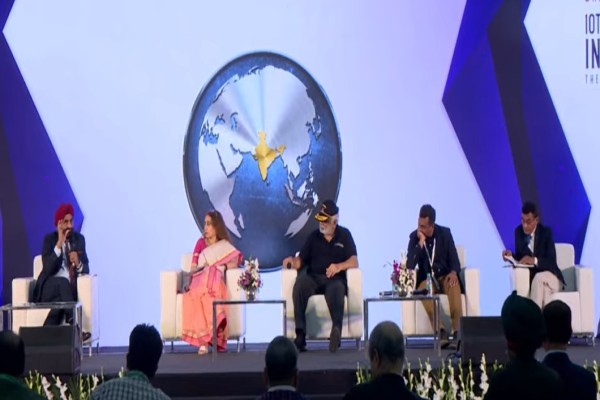
The tension between innovation and inertia was on full display at the India Defence Conclave in New Delhi, where Indian entrepreneurs and global collaborators urged a radical rethink of how India buys and builds military technology.
The session on “Ease of Business and Speed of Acquisition” brought together officials and industry veterans, but it was the voice of Sanjeev Kulkarni, a Silicon Valley technologist turned defence investor, that cut through with blunt clarity. “Our biggest enemy is time,” he said. “Every month of delay in signing a contract kills innovation.”
Kulkarni, CEO of Optimus Logic and founder of SessionAI (USA), said India’s defence procurement system must evolve to reflect the rapid tempo of modern technology. His company, which developed India’s first 5G handset, now builds secure communication systems for defence and dual-use industries. “In our world, chipsets and components have short lifespans. If trials take two years, the technology we’re evaluated on is already obsolete,” he warned.
The discussion came as Innopraktika, a Russian innovation body, announced plans for a technology hub in India in partnership with the Chamber for Indo-Russo Technology Collaboration (CIRTC). The hub will serve as a bridge for Russian IT and AI firms to enter the Indian market and co-develop high-tech products with local partners.
Its stated aim is to help India achieve “technological sovereignty” by reducing reliance on Western technologies and nurturing indigenous innovation. Among its planned objectives are bilateral research exchange, standardisation of AI and digital technologies, and support for start-ups on both sides. “This is not just about market access,” one industry official said. “It’s about aligning two technology ecosystems that are looking for autonomy.”
Kulkarni, who has advised and invested in both Indian and international defence start-ups, welcomed such collaborations, provided they fit into India’s self-reliance framework. “What we need is not isolation, but intelligent partnership,” he said. “If Russia or anyone can help Indian companies build core tech here—chipsets, AI, secure software—that’s good for our sovereignty.”
But even as new partnerships emerge, domestic bottlenecks persist. Kulkarni pointed out that while India’s defence manufacturing has doubled in six years, procedural slowdowns still drain momentum from start-ups. “We can’t move at the speed of the private tech sector globally if we’re waiting months for file movement,” he said.
He urged the government to prioritise speed and scale in contract awards, calling them “lifelines for small innovators”. Without such support, he warned, India risks losing the very start-ups it seeks to empower under Atmanirbhar Bharat.
Supporting his view, Air Marshal (Retd.) S.B. Deo, now head of JSR Dynamics, said funding remains the weakest link. “MSMEs can’t bootstrap missiles or drones. You need debt, but banks still see defence as risky. Even a ten-day delay can destroy cash flow,” he said, adding that the system must eliminate conflicts of interest between state-run entities and private developers.
Admiral Vashishta, formerly with the Navy’s quality assurance wing, echoed this sentiment. He argued that rigid specifications and lack of accessible test facilities often hold back indigenous innovation. “If a product meets 98% of functional requirements and is safe, it should be accepted as Version 1. Otherwise, nothing moves forward,” he said.
Responding to the criticism, Dipti Mohil Chawla, Additional Secretary, Ministry of Defence, defended the need for procedural safeguards.
“Procedure is not the villain—it is the backbone of transparency,” she said, adding that DAP 2025 would embed faster testing cycles, parallel trials, and third-party certifications to reduce delays. “We are committed to both spectrums — the industry and the armed forces. DAP 2025 will not be about paperwork; it will be about performance,” she told the audience.
Moderator Rajinder S. Bhatia, head of Defence Business at Kalyani Group, summarised the discussion: “The acquisition cycle cannot be longer than the technology development cycle. If it is, you end up buying yesterday’s tech for tomorrow’s wars.”
By the session’s close, the consensus was unmistakable: India’s procurement ecosystem must evolve to match the pace of innovation. The convergence of policy reform, start-up demand, and international collaboration — symbolised by the planned Indo-Russian tech hub — signals a turning point. For entrepreneurs like Kulkarni, the hope is that DAP 2025 will finally connect India’s aspirations for self-reliance with the reality of global technology cycles. “We don’t want to import innovation,” he said. “We want to build it here—faster.”
In a career spanning three decades and counting, Ramananda (Ram to his friends) has been the foreign editor of The Telegraph, Outlook Magazine and the New Indian Express. He helped set up rediff.com’s editorial operations in San Jose and New York, helmed sify.com, and was the founder editor of India.com.
His work has featured in national and international publications like the Al Jazeera Centre for Studies, Global Times and Ashahi Shimbun. But his one constant over all these years, he says, has been the attempt to understand rising India’s place in the world.
He can rustle up a mean salad, his oil-less pepper chicken is to die for, and all it takes is some beer and rhythm and blues to rock his soul.
Talk to him about foreign and strategic affairs, media, South Asia, China, and of course India.




